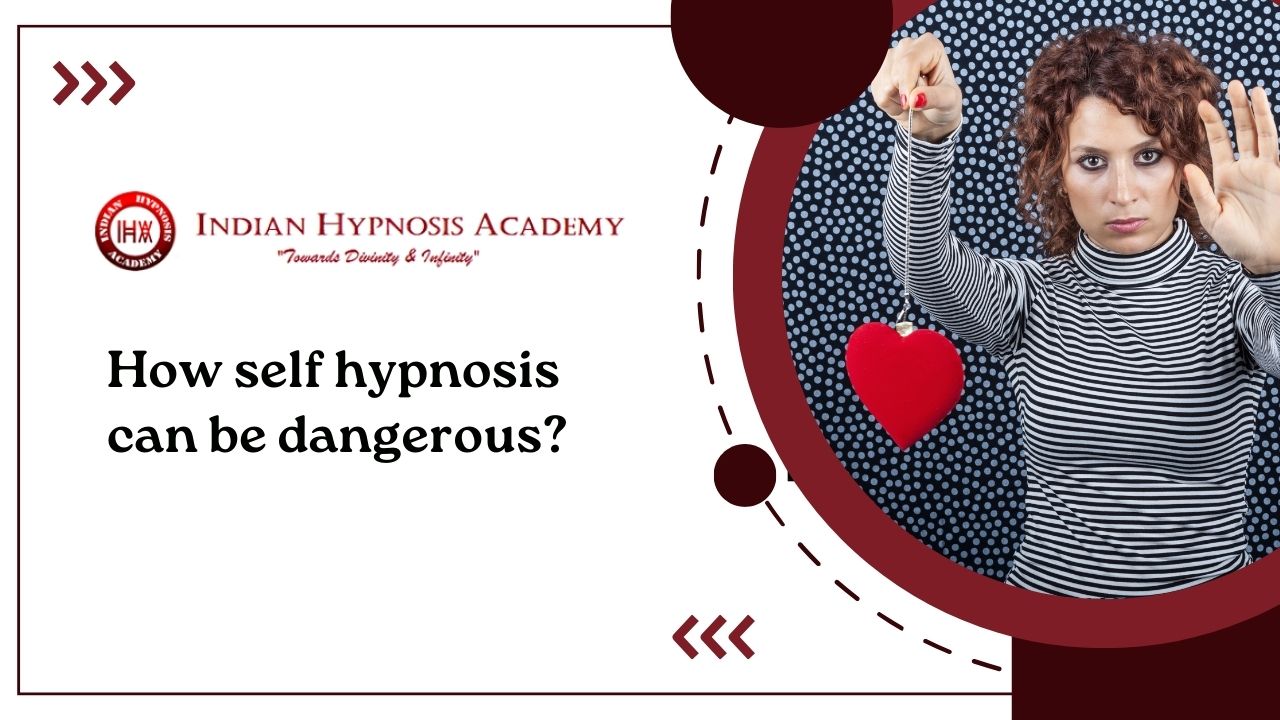Have you ever tried to tap into the power of your subconscious mind through self hypnosis? While it may seem like a fascinating way to address issues or improve aspects of your life, there are potential dangers that come with delving into this practice without proper guidance. In this blog post, we will explore the risks and negative effects of self hypnosis when not approached with caution and expertise. Let’s dive in and uncover the hidden hazards that can lurk beneath the surface of this seemingly harmless technique.
Understanding Self Hypnosis
Self hypnosis is a technique that involves inducing a state of focused attention and heightened suggestibility in oneself. It aims to access the subconscious mind to promote positive changes in behavior, thoughts, or emotions. By using relaxation techniques and repetitive affirmations, individuals attempt to reprogram their beliefs and habits at a deeper level.
During self hypnosis, the individual enters a trance-like state where they are more receptive to suggestions. This altered state of consciousness can be compared to daydreaming or being deeply absorbed in a book or movie. The key principle behind self hypnosis is that by bypassing the critical faculty of the conscious mind, one can directly influence the subconscious mind.
Practitioners often use visualization techniques and positive affirmations to instill new beliefs or behaviors into their subconscious. Self hypnosis sessions typically involve finding a quiet space, relaxing the body through deep breathing exercises, and focusing on specific goals or intentions for change.
The Potential Dangers of Self Hypnosis
Self hypnosis, a practice that involves inducing a hypnotic state on your own, may seem like an appealing way to address various issues. However, it’s crucial to be aware of the potential dangers associated with self hypnosis.
One significant risk is the possibility of creating false memories or beliefs during self hypnosis sessions. These fabricated thoughts can impact your perception of reality and lead to confusion or distress.
Moreover, without proper training and guidance from a professional, individuals engaging in self hypnosis may unknowingly trigger repressed emotions or traumatic experiences. This can result in heightened anxiety, emotional instability, or even exacerbate existing mental health conditions.
Another danger lies in the lack of control over the depth of trance induced during self hypnosis. This could potentially lead to unintended consequences and negative psychological effects if not managed responsibly.
In essence, while self hypnosis has its benefits when practiced safely and under supervision – it’s essential to acknowledge the risks involved and approach this technique with caution.
Risks of Using Self Hypnosis Without Proper Training
Many individuals are drawn to self-hypnosis as a means of addressing various issues or improving their well-being. However, diving into self-hypnosis without proper training can pose significant risks. Without guidance from a trained professional, the individual may inadvertently access traumatic memories or emotions that they are not equipped to handle.
Moreover, without understanding the intricacies of hypnosis, there is a risk of unintentionally reinforcing negative thought patterns or beliefs during the process. This can lead to counterproductive results and potentially worsen existing mental health conditions.
Self-hypnosis techniques vary widely, and using them indiscriminately without an understanding of one’s own susceptibility to suggestion can have unintended consequences. Furthermore, failing to properly emerge from a hypnotic state can result in feelings of disorientation or heightened suggestibility even after the session has ended.
It is crucial for individuals considering self-hypnosis to recognize these potential risks and seek guidance from qualified professionals before delving into this practice independently.
Negative Effects on Mental Health
Self hypnosis, when practiced without proper guidance, can potentially lead to negative effects on mental health. Engaging in self-hypnosis techniques without understanding the risks involved can have detrimental consequences on one’s psychological well-being. It is essential to recognize that delving into the subconscious mind through self-hypnosis may unearth unresolved emotions or trauma that could exacerbate existing mental health issues.
Individuals with pre-existing conditions such as anxiety disorders or depression should approach self-hypnosis cautiously, as it has the potential to intensify these conditions if not utilized correctly. Ignoring underlying vulnerabilities and blindly proceeding with self-hypnosis exercises can result in heightened feelings of distress or emotional instability.
Moreover, prolonged use of improper self-hypnosis techniques may create a dependency on this method for managing emotions, leading to difficulties in coping with everyday challenges independently. Seeking professional help and guidance before embarking on a journey of self-hypnosis is crucial to safeguarding one’s mental well-being and preventing adverse outcomes from occurring.
The Importance of Seeking Professional Help
Seeking professional help when it comes to self-hypnosis is crucial. Professionals have the expertise and experience to guide you safely through the process. They can assess your individual needs and tailor a suitable approach for you.
Professional hypnotherapists are trained to recognize any potential risks or underlying issues that may arise during self-hypnosis sessions. They can provide personalized support and address any concerns you may have along the way.
By working with a professional, you can ensure that your mental well-being is prioritized throughout the self-hypnosis journey. Their guidance can help prevent any negative effects on your mental health and overall mindset.
Don’t underestimate the value of seeking assistance from someone who understands the intricacies of hypnosis. Professional support can make a significant difference in ensuring a safe and positive experience with self-hypnosis.
How to Practice Self Hypnosis Safely
When practicing self-hypnosis, creating a safe environment is crucial. Find a quiet and comfortable space where you won’t be disturbed. Sit or lie down in a relaxed position and focus on your breathing to enter a state of relaxation.
Start by setting clear intentions for your session. Whether it’s reducing stress, improving sleep, or boosting confidence, having a specific goal will guide your subconscious mind during the process.
Use positive affirmations and visualization techniques to reinforce the desired outcome. Speak to yourself in present tense statements like “I am calm and centered” or “I achieve my goals effortlessly.”
Stay mindful of your emotions throughout the practice. If you start feeling overwhelmed or anxious, gently bring yourself back to the present moment by focusing on your breath.
After completing the session, take time to reflect on how you feel. Notice any changes in your thoughts or behaviors as a result of the self-hypnosis practice.
Alternatives to Self Hypnosis
If you’re looking for alternatives to self-hypnosis, there are various techniques you can explore. Meditation is a popular choice for relaxation and mental clarity. By focusing on your breath or a mantra, you can achieve a similar state of deep relaxation without the potential risks associated with hypnosis.
Another alternative is mindfulness practices. Being present in the moment and observing your thoughts without judgment can help reduce stress and increase self-awareness. Yoga combines physical movement with mindful breathing, promoting overall well-being.
Progressive muscle relaxation involves tensing and releasing different muscle groups to release tension from the body. This technique is effective in reducing anxiety and improving sleep quality.
Guided imagery uses visualization to create calming mental images that promote relaxation and positive emotions. It can be a powerful tool for managing stress and enhancing creativity.
Exploring these alternatives can provide you with safe and effective ways to improve your mental well-being without delving into the potential dangers of self-hypnosis.
Real Life Incidents and the Risks of Misusing Self Hypnosis
In real life, there have been instances where individuals misused self hypnosis techniques and faced adverse consequences. One such incident involved a person attempting to address severe anxiety through self hypnosis without proper guidance. Instead of improvement, the individual experienced heightened anxiety levels and panic attacks.
Another case highlighted the risks of using self hypnosis for memory retrieval without professional supervision. The individual ended up creating false memories that led to confusion and emotional distress.
Misusing self hypnosis can also lead to dissociation from reality, causing individuals to lose touch with their surroundings and experience disorientation. This can be particularly dangerous if practiced in unsafe environments or while engaging in activities that require full awareness.
These real-life incidents serve as cautionary tales, emphasizing the importance of approaching self hypnosis with care and seeking guidance from trained professionals when necessary. It’s crucial to understand the potential risks involved and prioritize safety when exploring hypnotic practices on your own.
Conclusion: The Importance of Being Cautious with Self Hypnosis
Self hypnosis can be a powerful tool when used correctly and safely. However, it is essential to understand the potential risks and dangers associated with it. Without proper training and guidance, self hypnosis can have negative effects on mental health and overall well-being.
Seeking professional help from a trained hypnotist or therapist is crucial to ensure that you are practicing self hypnosis in a safe and effective manner. Remember that your mental health should always come first, and it’s okay to ask for help when needed.
By being cautious and mindful of the risks involved in self hypnosis, you can harness its benefits while avoiding any potential harm. Stay informed, seek guidance when necessary, and prioritize your well-being above all else when exploring the world of self hypnosis.




